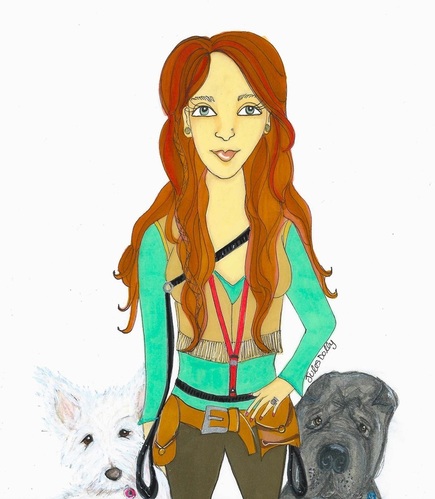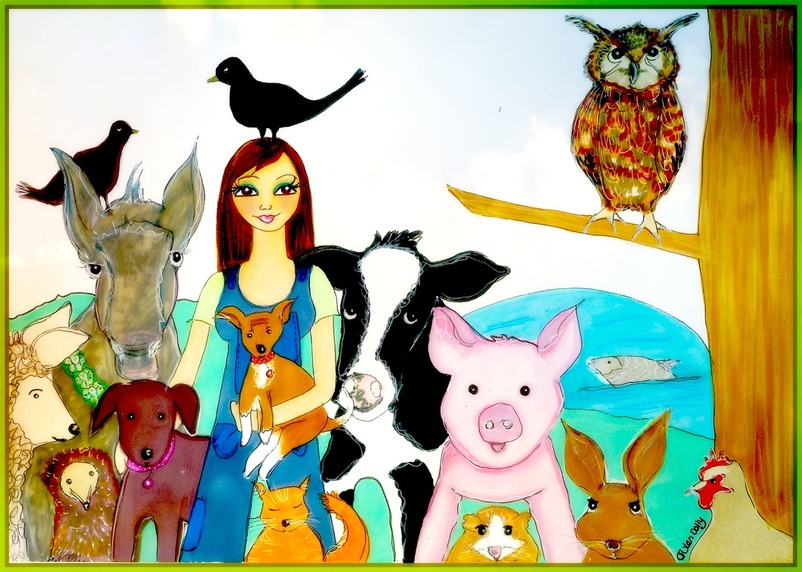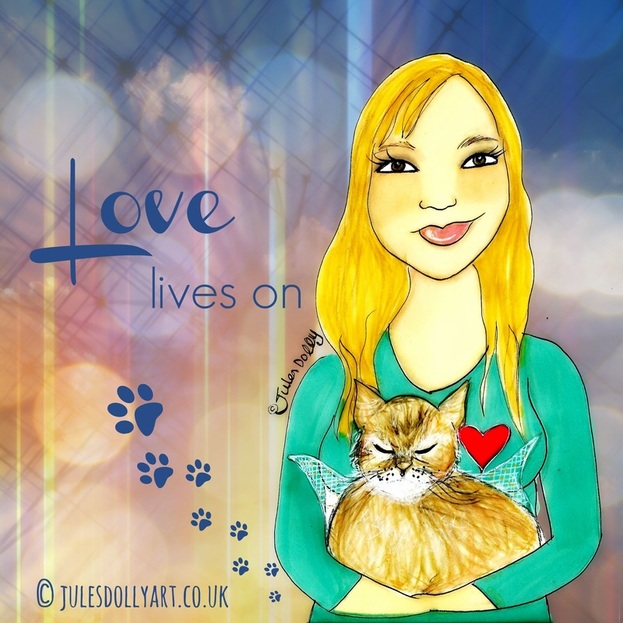Reiki Therapy
Reiki is a system of natural healing founded by Dr Mikao Usui. All Reiki practitioners have a direct lineage back to Dr Usui. It is widely used as a complementary modality where the practitioner acts as a conduit for healing energy and it is also a complementary therapy for animals.
Reiki can:
|
Reiki for Humans

What to expect:
I will explain the process, and ask if you have any specific needs. Be sure to let me know if you have a health condition that might impact you lying flat on your back or front or if you have any areas that are sensitive to touch.
What does the session consist of?
A complete Reiki session is offered to you, fully clothed, lying on a treatment table or sitting comfortably supported in a chair.
Most commonly, Reiki is offered through light, non-invasive touch with my hands placed and held on a series of locations on the head and front and back of the torso. The placement of the hands is never intrusive or inappropriate, nor is there any pressure.
Additional placements on the limbs can be done as needed (for example, if there is an injury or surgical scar), and sometimes this is done. I may hold my hands just off the body if needed (for example, in the presence of an open wound or burn).
What might I experience?
"I feel very refreshed and seem to be thinking more clearly."
"I think I fell asleep."
"I can't believe how hot your hands got!"
"I feel more relaxed than even after a massage."
"My headache is gone."
These are some of things people typically say after a Reiki session.
The experience of Reiki is subjective, changeable, and sometimes very subtle. People often experience heat in the my hands, but sometimes my hands feel cool. Other common experiences are subtle tingles wherever my hands are placed. People often comment how comforting they find the experience of Reiki to be. An interesting study reported that recipients frequently feel that they are hovering in a threshold state of consciousness, simultaneously aware of their surroundings and deeply indrawn. Some people fall into a deep, sleeplike meditative state. Sometimes the experience of Reiki is dramatic, while for other people, the first session in particular may be uneventful, although they feel somehow better afterward.
The most common experience is an almost immediate release of stress and a feeling of deep relaxation.
Reiki is cumulative and even people who don't notice much the first time usually have progressively deeper experiences if they continue. Besides the immediate experience of the Reiki, you may notice other changes that continue to unfold as the day goes on: perhaps stronger digestion, a sense of being more centred and poised and less reactive, and sleeping deeply that night.
What should I do during the session?
As the session progresses, you will feel more relaxed. If you become uncomfortable, you can adjust your position at any time. Be sure to ask for anything that will add to your comfort, such as additional support under your knees or a blanket. This is your special time and I'm there to help you.
Receiving Reiki is a wonderfully passive experience. Don't try to relax, just let the Reiki relax you. Your state will shift quite naturally as the session proceeds. Meanwhile feel free to daydream, enjoy the music, or simply observe your breath or the sensations of the therapy.
What happens after the session?
Do not expect a diagnosis, as that is not part of Reiki. Sometimes I may make common sense suggestions for after-care, such as drinking water and following your body's needs.
Although people typically leave a Reiki session feeling refreshed, sometimes they notice feeling more tired in the evening than usual. This is not viewed as an adverse reaction, but rather as the body's natural healing response, something to be heeded. People commonly report a sense of calm and mental clarity and sleeping well after Reiki.
How many sessions should I receive?
Four sessions is a traditional recommendation and gives you time to evaluate what benefits you are receiving. We can chat about how best to space the sessions to suit your needs and your schedule.
ALL REIKI THERAPY SESSIONS WITH JULIA LAST 60 MINUTES (45 MINS TREATMENT) AND COST £30
I will explain the process, and ask if you have any specific needs. Be sure to let me know if you have a health condition that might impact you lying flat on your back or front or if you have any areas that are sensitive to touch.
What does the session consist of?
A complete Reiki session is offered to you, fully clothed, lying on a treatment table or sitting comfortably supported in a chair.
Most commonly, Reiki is offered through light, non-invasive touch with my hands placed and held on a series of locations on the head and front and back of the torso. The placement of the hands is never intrusive or inappropriate, nor is there any pressure.
Additional placements on the limbs can be done as needed (for example, if there is an injury or surgical scar), and sometimes this is done. I may hold my hands just off the body if needed (for example, in the presence of an open wound or burn).
What might I experience?
"I feel very refreshed and seem to be thinking more clearly."
"I think I fell asleep."
"I can't believe how hot your hands got!"
"I feel more relaxed than even after a massage."
"My headache is gone."
These are some of things people typically say after a Reiki session.
The experience of Reiki is subjective, changeable, and sometimes very subtle. People often experience heat in the my hands, but sometimes my hands feel cool. Other common experiences are subtle tingles wherever my hands are placed. People often comment how comforting they find the experience of Reiki to be. An interesting study reported that recipients frequently feel that they are hovering in a threshold state of consciousness, simultaneously aware of their surroundings and deeply indrawn. Some people fall into a deep, sleeplike meditative state. Sometimes the experience of Reiki is dramatic, while for other people, the first session in particular may be uneventful, although they feel somehow better afterward.
The most common experience is an almost immediate release of stress and a feeling of deep relaxation.
Reiki is cumulative and even people who don't notice much the first time usually have progressively deeper experiences if they continue. Besides the immediate experience of the Reiki, you may notice other changes that continue to unfold as the day goes on: perhaps stronger digestion, a sense of being more centred and poised and less reactive, and sleeping deeply that night.
What should I do during the session?
- Make sure you visit the toilet before your session so that you are able to lie down comfortably.
- Especially if you have any shyness about the session, ask me to show you the hand placements before starting so you are very clear what to expect.
- Let me know your needs before you start. Although I will ask. For example, if you have trouble breathing and lying flat is uncomfortable, say so. Or mention if you have had surgery recently and don't want to be touched where the scar is still tender (the practitioner can float her hand here). If you are pregnant or have digestive complaints, it may not be feasible to lie on your stomach. Let me know.
As the session progresses, you will feel more relaxed. If you become uncomfortable, you can adjust your position at any time. Be sure to ask for anything that will add to your comfort, such as additional support under your knees or a blanket. This is your special time and I'm there to help you.
Receiving Reiki is a wonderfully passive experience. Don't try to relax, just let the Reiki relax you. Your state will shift quite naturally as the session proceeds. Meanwhile feel free to daydream, enjoy the music, or simply observe your breath or the sensations of the therapy.
What happens after the session?
Do not expect a diagnosis, as that is not part of Reiki. Sometimes I may make common sense suggestions for after-care, such as drinking water and following your body's needs.
Although people typically leave a Reiki session feeling refreshed, sometimes they notice feeling more tired in the evening than usual. This is not viewed as an adverse reaction, but rather as the body's natural healing response, something to be heeded. People commonly report a sense of calm and mental clarity and sleeping well after Reiki.
How many sessions should I receive?
Four sessions is a traditional recommendation and gives you time to evaluate what benefits you are receiving. We can chat about how best to space the sessions to suit your needs and your schedule.
ALL REIKI THERAPY SESSIONS WITH JULIA LAST 60 MINUTES (45 MINS TREATMENT) AND COST £30
What happens during a distant healing?
Pretty much all that happens in an in-person session happens during a distant healing. I know that may seem strange to understand but I will be working remotely, using my own self as a proxy for your body.
I find that it better for us to agree a mutually convenient time when you can also lie down on your bed for up to 45 minutes. This way I can connect with you and the healing is subtle and powerful. All the same questions apply about preparing for the session as well as how you may feel and what to expect after the session.
We can connect afterwards via email, text or Whatsapp.
I find that it better for us to agree a mutually convenient time when you can also lie down on your bed for up to 45 minutes. This way I can connect with you and the healing is subtle and powerful. All the same questions apply about preparing for the session as well as how you may feel and what to expect after the session.
We can connect afterwards via email, text or Whatsapp.
You will be redirected to Paypal to pay for your session
Please choose your currency.
Please choose your currency.
|
REIKI THERAPY
60 MINUTES (45 MINUTES TREATMENT) £30 GBP (IN PERSON - LIVERPOOL UK) |
|
Once you have paid for your session, I will be in touch within 24 hours to book your time.
With a distant healing, we will still book a time.
With a distant healing, we will still book a time.
REIKI FOR ANIMALS
Being an extremely gentle, non invasive practise with or without direct contact, it is a wonderful energy exchange to animals where direct touch or physical presence is not necessary. Therefore in shelters, it works beautifully; calming and relaxing animals that are stressed and anxious, enabling any physical healing to be supported. The healing takes place through energetic rebalancing.
What happens? if I am in next to your animal I will offer up Reiki, asking their permission, I may gently lay my hands on them, or above their body in a series of hand positions, depending how receptive they are. Each hand position is held for a few minutes. I am intuitively drawn to certain areas and when this happens, I am working with the energy. Energy (called “chi”) is drawn through me to you, helping to produce a state of balance.
How might they feel? Deeply relaxed, perhaps heat from my hands, or coolness, sometimes tingling, a feeling of floating or sinking, or perhaps nothing at all. It varies. No matter what you feel, Reiki is giving you what you need.
I often invite you to experience Reiki before your animal so you know how it feels. This way they will sense the energy in the room and often relax with you.
The experience of a Reiki treatment is unique to each animal. Our time together will last between 45 minutes and an hour. Please read this important note:
How might they feel? Deeply relaxed, perhaps heat from my hands, or coolness, sometimes tingling, a feeling of floating or sinking, or perhaps nothing at all. It varies. No matter what you feel, Reiki is giving you what you need.
I often invite you to experience Reiki before your animal so you know how it feels. This way they will sense the energy in the room and often relax with you.
The experience of a Reiki treatment is unique to each animal. Our time together will last between 45 minutes and an hour. Please read this important note:
- Reiki is not a substitute for veterinary treatment. It is crucial to have consulted your Vet.
- Reiki is safe and will complement any form of veterinary treatment.
- A Reiki practitioner will not diagnose or recommend any form of treatment.
Distant Healing for Animals and Communication
Distant healing sessions for animals are truly magical. I connect with your animal and proceed to give them a healing. At the same time, I communicate with your animals. In our conversation leading up to the session, I ask you to give me 3 questions you wish to know from you animal. These are what I will focus upon in the communication and healing I know that may seem strange to understand but I will be working remotely, using my own self as a proxy for your body.
We can connect afterwards via email, text or Whatsapp and I often type up the messages and feedback I get during the distant healing.
We can connect afterwards via email, text or Whatsapp and I often type up the messages and feedback I get during the distant healing.
You will be redirected to Paypal to pay for your session
Please choose whether you want in person (Liverpool) or Distant
Choose your currency.
Please choose whether you want in person (Liverpool) or Distant
Choose your currency.
|
REIKI THERAPY FOR ANIMALS
60 MINUTES (45 MINUTES TREATMENT) £30 GBP (IN PERSON - LIVERPOOL UK) |
|
Once you have paid for your session, I will be in touch within 24 hours to book your time.
With a distant healing, we will still book a time.
With a distant healing, we will still book a time.
What happens during a Reiki healing session for dogs and cats?

When it comes to offering Reiki to animals, it's often best that I come to you as it is less stressful for them. It is basically where they feel more settled. We will chat about this beforehand and find the best way. As I work with both humans and animals I therefore support the whole family whilst healing your lovely animal. In our initial meeting I will undertake a full consultation so that I can be aware of any particular issues.
In working with your animal I will only be able to do so in accordance with the RCVS Veterinary Surgeons Act of 1966.
Reiki healing is not a replacement for veterinary treatment I am not allowed, by law, to do so. Reiki will complement and support any treatment as a healing, relaxing, and energy giving session. A Reiki healing session will never be forced on your lovely animal, they are offered the healing energy and will either move forward towards me, and settle into a relaxing deep sleep on the floor nearby, or they will move into the reiki heart zone and then out of it again. It is very rare that they don't wish to receive.
Animals are so astute and tuned in when it comes to vibration and energy - they can feel what's good for them and will respond to it. Reiki helps with anxiety, feelings of abandonment and help with convalescing after surgery.
In working with your animal I will only be able to do so in accordance with the RCVS Veterinary Surgeons Act of 1966.
Reiki healing is not a replacement for veterinary treatment I am not allowed, by law, to do so. Reiki will complement and support any treatment as a healing, relaxing, and energy giving session. A Reiki healing session will never be forced on your lovely animal, they are offered the healing energy and will either move forward towards me, and settle into a relaxing deep sleep on the floor nearby, or they will move into the reiki heart zone and then out of it again. It is very rare that they don't wish to receive.
Animals are so astute and tuned in when it comes to vibration and energy - they can feel what's good for them and will respond to it. Reiki helps with anxiety, feelings of abandonment and help with convalescing after surgery.
Giving Reiki To Animals-
Please note that the RCVS classes Reiki in the same category as Faith Healing/Spiritual Healing and therefore Reiki is not considered the practise of veterinary surgery. See below.
The RCVS Guide to Professional Conduct 2008 contains advice on the treatment of animals by non-veterinary surgeons. This information is in part 2F; which states;
‘1. The Veterinary Surgeons Act 1966 (Section 19) provides, subject to a number of exceptions, that only registered members of the Royal College of Veterinary Surgeons may practise veterinary surgery. 'Veterinary surgery' is defined within the Act as encompassing the 'art and science of veterinary surgery and medicine' which includes the diagnosis of diseases and injuries in animals, tests performed on animals for diagnostic purposes, advice based upon a diagnosis and surgical operations which may not necessarily form part of a treatment. These restrictions are in the interests of ensuring that animals are treated only by people qualified to do so.’
This part of the guidance goes on to say that;
‘Physiotherapists, osteopaths and chiropractors
15. The Veterinary Surgery (Exemptions) Order 1962 allows for the treatment of animals by physiotherapy, provided that the animal has first been seen by a veterinary surgeon who has diagnosed the condition and decided that it should be treated by physiotherapy under his/her direction.
16. 'Physiotherapy' is interpreted as including all kinds of manipulative therapy. It therefore includes osteopathy and chiropractic but would not, for example, include acupuncture or aromatherapy (see Part 1I, paragraph 2, Your responsibilities in relation to the treatment of animals by non-veterinary surgeons).
Other complementary therapists
17. All other forms of complementary therapy in the treatment of animals, including homoeopathy, must be administered by veterinary surgeons. It is illegal, in terms of the Veterinary Surgeons Act 1966, for lay practitioners however qualified in the human field, to treat animals. At the same time it is incumbent on veterinary surgeons offering any complementary therapy to ensure that they are adequately trained in its application.
Faith healing
18. Faith healers are required in terms of the Code of Practice of the Confederation of Healing Organisations, to ensure that animals have been seen by a veterinary surgeon who is content for healing to be given by the laying on of hands.’
If any manipulative therapy is included in the treatment you provide, the Veterinary Surgeon (Exemtions) Order 1962 would apply. The 1962 Order allows for the treatment of animals by physiotherapy, provided that the animal has first been seen by a veterinary surgeon who has diagnosed the condition and decided that it should be treated by physiotherapy under his/her direction. Physiotherapy is defined as including all kinds of manipulative therapy.
Therefore faith healing, spiritual healing (including Reiki) are procedures that would not normally be regarded as the practise of veterinary surgery under the Veterinary Surgeons Act 1966; though it would be prudent for animal to have been seen by a veterinary surgeon when this is being performed for reasons other than well-being.
If you require further information please contact the RCVS direct: Royal College of Veterinary Surgeons, Belgravia House, 63-64 Horseferry Road , London SW1P 2AF .
This information is given Without Prejudice.
Thank you to the Reiki Council for this reproduction:
for more information please visit http://www.reikicouncil.org.uk/
Please note that the RCVS classes Reiki in the same category as Faith Healing/Spiritual Healing and therefore Reiki is not considered the practise of veterinary surgery. See below.
The RCVS Guide to Professional Conduct 2008 contains advice on the treatment of animals by non-veterinary surgeons. This information is in part 2F; which states;
‘1. The Veterinary Surgeons Act 1966 (Section 19) provides, subject to a number of exceptions, that only registered members of the Royal College of Veterinary Surgeons may practise veterinary surgery. 'Veterinary surgery' is defined within the Act as encompassing the 'art and science of veterinary surgery and medicine' which includes the diagnosis of diseases and injuries in animals, tests performed on animals for diagnostic purposes, advice based upon a diagnosis and surgical operations which may not necessarily form part of a treatment. These restrictions are in the interests of ensuring that animals are treated only by people qualified to do so.’
This part of the guidance goes on to say that;
‘Physiotherapists, osteopaths and chiropractors
15. The Veterinary Surgery (Exemptions) Order 1962 allows for the treatment of animals by physiotherapy, provided that the animal has first been seen by a veterinary surgeon who has diagnosed the condition and decided that it should be treated by physiotherapy under his/her direction.
16. 'Physiotherapy' is interpreted as including all kinds of manipulative therapy. It therefore includes osteopathy and chiropractic but would not, for example, include acupuncture or aromatherapy (see Part 1I, paragraph 2, Your responsibilities in relation to the treatment of animals by non-veterinary surgeons).
Other complementary therapists
17. All other forms of complementary therapy in the treatment of animals, including homoeopathy, must be administered by veterinary surgeons. It is illegal, in terms of the Veterinary Surgeons Act 1966, for lay practitioners however qualified in the human field, to treat animals. At the same time it is incumbent on veterinary surgeons offering any complementary therapy to ensure that they are adequately trained in its application.
Faith healing
18. Faith healers are required in terms of the Code of Practice of the Confederation of Healing Organisations, to ensure that animals have been seen by a veterinary surgeon who is content for healing to be given by the laying on of hands.’
If any manipulative therapy is included in the treatment you provide, the Veterinary Surgeon (Exemtions) Order 1962 would apply. The 1962 Order allows for the treatment of animals by physiotherapy, provided that the animal has first been seen by a veterinary surgeon who has diagnosed the condition and decided that it should be treated by physiotherapy under his/her direction. Physiotherapy is defined as including all kinds of manipulative therapy.
Therefore faith healing, spiritual healing (including Reiki) are procedures that would not normally be regarded as the practise of veterinary surgery under the Veterinary Surgeons Act 1966; though it would be prudent for animal to have been seen by a veterinary surgeon when this is being performed for reasons other than well-being.
If you require further information please contact the RCVS direct: Royal College of Veterinary Surgeons, Belgravia House, 63-64 Horseferry Road , London SW1P 2AF .
This information is given Without Prejudice.
Thank you to the Reiki Council for this reproduction:
for more information please visit http://www.reikicouncil.org.uk/



